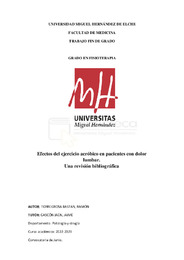Resumen :
INTRODUCCIÓN: El dolor lumbar crónico es muy frecuente según la Encuesta Europea de Salud en España 2020. Tanto en mujeres como en hombres se sitúan como el tercer problema de salud más importante siendo en mujeres un (17,1%) y en hombres un (10,1%) su prevalencia. El tratamiento convencional suele ser farmacológico y una terapia pasiva de reposo. Sin embargo, en la última década se aboga por el ejercicio y el movimiento como herramienta para disminuir el dolor lumbar. OBJETIVO: Conocer, a través de la literatura científica, el efecto del ejercicio aeróbico como tratamiento en pacientes con dolor lumbar.
MATERIAL Y METODOS: Se utilizó una búsqueda bibliográfica en las bases de datos Pubmed, PEDro, Web of Science y Scopus de ensayos clínicos aleatorizados que trataran sobre la efectividad del ejercicio aeróbico como tratamiento del dolor lumbar.
RESULTADOS: Se incluyeron diez artículos, cuatro de ellos realizaban caminata con un podómetro, dos lo realizaban en cinta rodante, dos más combinaban cinta y bicicleta, otro solo bicicleta y finalmente uno que realizaba el ejercicio aeróbico a través de un step. Las medidas de resultado más comunes fueron la discapacidad y el dolor.
CONCLUSIÓN: Existe evidencia moderada-alta de que el ejercicio aeróbico es una herramienta válida para mejorar el dolor y la discapacidad funcional en la patología lumbar. Sin embargo, hacen falta más estudios y de mayor calidad para identificar la modalidad y la dosificación más adecuada para disminuir el dolor lumbar.
INTRODUCTION: Chronic low back pain is very frequent according to the European Health Survey in Spain 2020. In both women and men it ranks as the third most important health problem, being in women (17.1%) and in men (10, 1%) its prevalence. Conventional treatment is usually pharmacological and passive rest therapy. However, in the last decade, exercise and movement have been advocated as a tool to reduce low back pain.
OBJETIVE: To know, through the scientific literature, the effect of aerobic exercise as a treatment in patients with low back pain.
MATERIAL AND METHODS: A bibliographic search was used in the Pubmed, PEDro, Web of Science and Scopus databases of randomized clinical trials that dealt with the effectiveness of aerobic exercise as a treatment for low back pain.
RESULTS: Ten articles were included, four of them walked with a pedometer, two did it on a treadmill, two more combined a treadmill and a bicycle, another only a bicycle, and finally one that performed aerobic exercise through a step. The most common outcome measures were disability and pain.
CONCLUSIONS: There is moderate-high evidence that aerobic exercise is a valid tool to improve pain and functional disability in lumbar pathology. However, more and higher quality studies are needed to identify the most appropriate modality and dosage to reduce low back pain
|
 La licencia se describe como: Atribución-NonComercial-NoDerivada 4.0 Internacional.
La licencia se describe como: Atribución-NonComercial-NoDerivada 4.0 Internacional.
.png)
